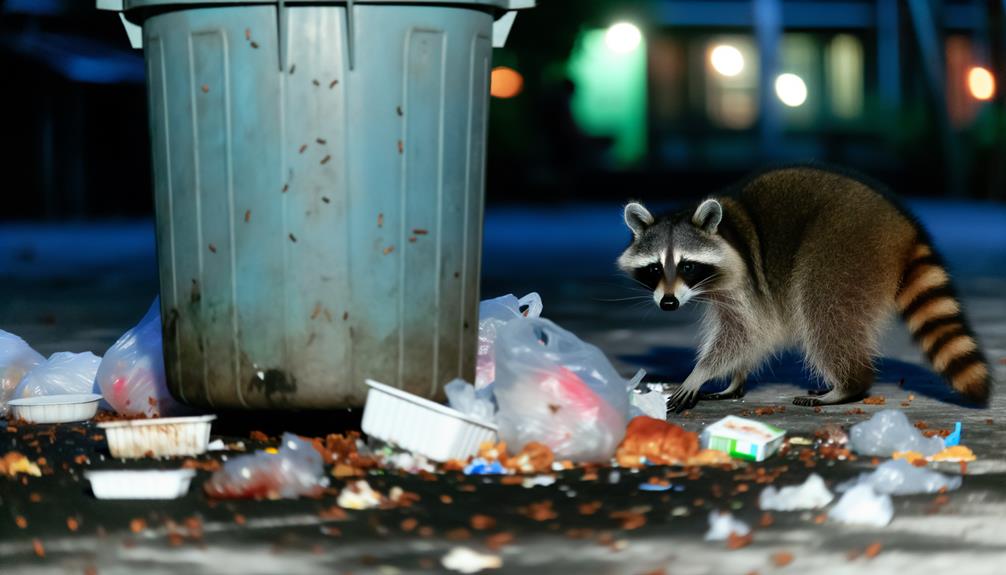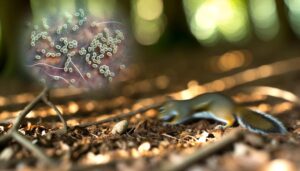How Do Raccoons Get Sick Eating Garbage?
Yes, raccoons can get sick from eating garbage. As omnivores, they are opportunistic feeders and often eat food scraps, packaging materials, and waste in urban environments.
This diet can lead to nutritional imbalances due to the consumption of high-calorie, low-nutrient foods and spoiled items. Additionally, exposure to chemicals and contaminated food items poses significant health risks, including bacterial infections, viral diseases, and neurological damage.
This behavior in urban settings can also lead to physical injuries and other long-term health issues. Understanding these risks offers deeper insights into raccoons' survival in urban habitats.

Key Takeaways
- Consuming garbage exposes raccoons to harmful chemicals and toxins, leading to health risks.
- High-calorie, low-nutrient foods from trash can cause nutritional imbalances in raccoons.
- Spoiled food in garbage can result in bacterial infections and gastrointestinal distress.
- Household waste may carry viral diseases and parasites that affect raccoons' health.
- Raccoons foraging in trash face potential neurological damage and organ failure from contaminated items.
Raccoons' Natural Diet
Raccoons are omnivorous mammals whose natural diet primarily consists of fruits, nuts, insects, small vertebrates, and aquatic organisms such as crayfish and frogs. This diverse dietary intake guarantees they receive a balanced array of nutrients, including proteins, fats, carbohydrates, and essential vitamins and minerals.
Studies have shown that raccoons are opportunistic feeders, capable of adapting their diet based on seasonal availability and habitat conditions. Their foraging behavior plays an essential role in ecosystem dynamics, aiding in seed dispersal and pest control.
For those dedicated to wildlife conservation and public health, understanding raccoons' natural dietary habits is vital. It informs strategies to minimize human-wildlife conflicts and safeguards the well-being of these adaptable yet vulnerable creatures.
Urban Raccoon Behavior
Urban raccoons exhibit distinct foraging patterns, primarily scavenging for food at night when human activity is minimal. Studies indicate that these nocturnal habits increase their encounters with human refuse, leading to higher rates of illness from ingesting contaminated or spoiled food.
Additionally, their frequent interactions with humans and domestic pets contribute to the spread of zoonotic diseases, further complicating urban wildlife management.
Foraging Patterns at Night
During nocturnal hours, raccoons exhibit specific foraging patterns that involve extensive exploration of urban environments, often leading them to rummage through human waste for sustenance. Research indicates that raccoons are highly adaptable and opportunistic feeders, capitalizing on the abundance of food found in garbage bins and dumpsters.
This behavior is characterized by:
- Systematic investigation: Raccoons use their sensitive paws to open containers and search for edible material.
- Territorial range: They typically cover a range of 1-3 square miles in urban settings.
- Dietary flexibility: Their diet includes fruits, vegetables, small animals, and human leftovers.
- Memory retention: Raccoons remember and revisit areas with reliable food sources.
These patterns highlight the raccoon's adaptability and the potential risks associated with consuming contaminated food.
Interaction With Humans
Amid increasing urbanization, the interaction between raccoons and humans has become more frequent, leading to both beneficial and adverse consequences for wildlife and community health.
Urban raccoons often scavenge through garbage, taking advantage of easily accessible food sources. This behavior, while adaptive, raises concerns about potential health risks for both raccoons and humans.
Studies have shown that raccoons can act as vectors for diseases such as rabies and leptospirosis, posing public health challenges. Conversely, their presence can offer ecological benefits, such as controlling pest populations.
Understanding raccoon behavior and promoting responsible waste management can mitigate negative impacts, ensuring coexistence that safeguards both human health and wildlife well-being. Community education and wildlife management strategies are essential in this regard.
Common Trash Items Consumed
A study of urban raccoon behavior shows that common trash items consumed by raccoons include food scraps, packaging materials, and household waste, which often lead to various health issues. These items are typically found in residential and commercial garbage bins, where raccoons forage for sustenance.
The following are commonly ingested items:
- Food scraps: Leftover human food, including bones, meat, and vegetable peelings.
- Packaging materials: Plastic wrappers, aluminum foil, and cardboard containers.
- Household waste: Items such as used paper towels, hygiene products, and cleaning materials.
- Contaminated food: Spoiled food items that can harbor harmful bacteria and toxins.
Such consumption patterns increase the risk of gastrointestinal issues, poisoning, and exposure to pathogens, adversely affecting raccoon health.
Nutritional Value of Garbage
Given the range of items raccoons consume from garbage, it is imperative to evaluate the nutritional value these discarded materials provide to urban wildlife.
Studies indicate that raccoons often ingest high-calorie, low-nutrient foods such as fast food remnants, sugary snacks, and processed items. While these foods provide immediate energy, they lack essential nutrients like vitamins, minerals, and proteins necessary for best health.
Additionally, discarded fruits and vegetables may offer some nutritional benefits, but their spoilage can reduce the overall value.
Examining the dietary intake of raccoons in urban settings reveals a diet skewed towards convenience rather than balanced nutrition, potentially leading to long-term health issues such as malnutrition and obesity.
This analysis underscores the need for responsible waste management.
Potential Toxins in Trash
Raccoons rummaging through trash are often exposed to harmful chemicals such as pesticides, cleaning agents, and automotive fluids, which can lead to severe health issues.
Additionally, discarded food items may be contaminated with bacteria or mold, posing further risks.
Toxic household waste, including batteries and electronic components, also contributes to the array of potential toxins these animals encounter.
Harmful Chemical Exposure
Numerous harmful chemicals, including pesticides, heavy metals, and household cleaning agents, are commonly found in urban garbage and pose significant health risks to raccoons that scavenge through trash for food. These toxic substances can lead to acute poisoning or chronic health issues in raccoons, compromising their immune systems and overall well-being. Research indicates that raccoons exposed to these chemicals may suffer from neurological damage, organ failure, and reproductive issues.
The ingestion of such toxins often results in:
- Neurological impairments, affecting coordination and behavior
- Organ damage, particularly to the liver and kidneys
- Reproductive issues, which can diminish population viability
- Increased mortality rates, due to compromised health and increased susceptibility to diseases
Efforts to secure trash and minimize chemical disposal in urban areas can mitigate these risks.
Contaminated Food Items
In addition to chemical hazards, urban garbage often contains contaminated food items that pose significant health risks to raccoons. These animals may ingest spoiled food, moldy bread, or remnants of processed meat, all of which can harbor harmful bacteria, fungi, and parasites. Such contaminants can lead to gastrointestinal distress, infections, and even systemic illnesses. Detailed studies have shown that the ingestion of contaminated food items can greatly reduce raccoon populations in urban areas due to increased morbidity and mortality.
| Contaminant Type | Potential Health Risk |
|---|---|
| Spoiled food | Gastrointestinal distress |
| Moldy bread | Fungal infections |
| Processed meat | Bacterial infections |
| Rotten fruits | Parasitic infestations |
| Dairy products | Lactose intolerance and bacterial growth |
Understanding these risks is essential for implementing effective waste management strategies.
Toxic Household Waste
Household waste often contains a variety of toxic substances, including cleaning chemicals, pesticides, and batteries, which pose significant health threats to raccoons that scavenge through urban trash. These harmful elements can lead to acute poisoning, chronic health issues, and even death in raccoons.
Scientific studies have identified several common hazardous household items that are particularly dangerous:
- Cleaning Products: Contain bleach, ammonia, and other corrosive substances that can cause internal burns and respiratory distress.
- Pesticides: Compounds like rodenticides and insecticides are highly toxic and can lead to neurological damage.
- Batteries: Leak heavy metals such as lead and mercury, which can cause organ failure.
- Medications: Improperly disposed prescription drugs can result in accidental overdoses.
Understanding these risks underscores the need for responsible waste management to protect urban wildlife.
Bacterial Infections
Due to their scavenging behavior, raccoons frequently ingest harmful bacteria from decomposing food waste, leading to a high incidence of bacterial infections. These infections can severely impact raccoon health, resulting in conditions such as gastroenteritis and septicemia. Studies indicate that common bacteria found in garbage, like Salmonella and E. coli, are prevalent culprits. Understanding these bacterial threats is essential for wildlife rehabilitation efforts and public health safety.
| Bacteria | Common Effects on Raccoons |
|---|---|
| Salmonella | Gastroenteritis, fever |
| E. coli | Diarrhea, abdominal pain |
| Clostridium | Tetanus, severe muscle spasms |
| Staphylococcus | Skin infections, abscesses |
| Listeria | Neurological symptoms, lethargy |
Effective waste management can mitigate these bacterial risks, underscoring the importance of responsible disposal practices.
Viral Diseases
Raccoons are particularly vulnerable to various viral diseases, which can worsen their health problems, especially when their immune systems are already compromised by poor nutrition and bacterial infections.
Among the most prevalent viral threats are:
- Canine Distemper Virus (CDV): This virus causes respiratory, gastrointestinal, and neurological symptoms and is often fatal.
- Rabies: A well-known zoonotic disease that affects the central nervous system, leading to severe neurological impairment and death.
- Raccoon Parvovirus: Similar to canine parvovirus, this virus attacks the intestinal lining, causing severe dehydration and malnutrition.
- Hepatitis: Some viral strains can infect raccoons, leading to liver dysfunction and systemic health deterioration.
These viral diseases can significantly impact raccoon populations, emphasizing the importance of public awareness and preventive measures.
Parasites From Garbage
How much does the ingestion of contaminated garbage contribute to parasitic infections in raccoons? Raccoons frequently forage through urban waste, which often contains parasitic organisms. Studies have shown that raccoons can contract a variety of parasites, including roundworms and coccidia, from ingesting contaminated food waste. The prevalence of parasitic infections is highly correlated with access to garbage, raising concerns for both raccoon health and potential zoonotic transmission to humans.
| Parasite | Source in Garbage | Health Impact on Raccoons |
|---|---|---|
| Roundworms | Contaminated food waste | Gastrointestinal distress |
| Coccidia | Infected animal feces | Diarrhea, dehydration |
| Giardia | Contaminated water | Malabsorption, weight loss |
| Tapeworms | Raw meat | Nutrient absorption issues |
| Toxoplasma | Infected cat feces | Neurological symptoms |
Understanding these risks is essential for developing effective wildlife management strategies.
Chemical Hazards
In addition to parasitic threats, the ingestion of chemical contaminants present in urban garbage poses significant health risks to raccoons. Exposure to various hazardous substances can lead to acute and chronic illnesses.
Common chemical hazards include:
- Pesticides: Often found in food waste, these can cause neurological damage and reproductive issues.
- Household Cleaners: Containing toxic ingredients like bleach and ammonia, these can result in gastrointestinal distress and respiratory problems.
- Heavy Metals: Items such as batteries and electronics may leak lead and mercury, leading to organ failure and developmental defects.
- Pharmaceuticals: Improperly disposed medications can disrupt endocrine systems and overall health.
These chemical hazards underscore the importance of proper waste management to mitigate risks to wildlife.
Physical Injuries
Frequently encountered in urban environments, physical injuries are a significant concern for raccoons rummaging through refuse. These injuries commonly result from sharp objects such as broken glass, metal cans, and plastic debris. Studies indicate that lacerations and puncture wounds are prevalent, often leading to infections if untreated.
Additionally, raccoons can suffer from fractures or dislocations due to accidental falls or entanglement in wires and other materials. The risk of encountering toxic substances, such as cleaning agents or pesticides, further exacerbates the potential for dermal injuries. The prevalence of such hazards necessitates a heightened awareness and intervention to minimize harm to these urban scavengers.
Understanding the types and causes of injuries can guide effective wildlife management and community outreach programs.
Adaptations for Survival
Raccoons possess a robust digestive system that allows them to process a diverse array of food sources, which is critical for their survival in urban environments.
Their opportunistic feeding habits enable them to exploit readily available resources, including human garbage, hence increasing their adaptability.
However, this behavior also exposes them to harmful substances and pathogens, leading to the observed increase in illness among urban raccoon populations.
Strong Digestive System
Possessing an exceptionally robust digestive system, raccoons exhibit several physiological adaptations that enable them to process a wide variety of foods, including those found in urban garbage. This adaptability is essential for their survival in diverse environments. Their digestive system is characterized by:
- Enzyme-rich saliva: Facilitates the breakdown of complex carbohydrates.
- Strong stomach acids: Efficiently digest proteins and neutralize harmful bacteria.
- Adaptable gut microbiome: Allows for the digestion of various food types, including spoiled or decomposing matter.
- Resilient liver function: Detoxifies harmful substances ingested from waste.
These adaptations indicate a highly specialized digestive system that supports raccoons in consuming nutritionally diverse and potentially hazardous foods, thereby minimizing the risk of illness from scavenging in urban areas.
Opportunistic Feeding Habits
An integral component of their survival strategy, the opportunistic feeding habits of raccoons enable them to exploit a broad range of food sources, from natural foraging to scavenging in human habitats. This adaptability has allowed raccoons to thrive in diverse environments, including urban areas.
Studies indicate that raccoons possess a highly developed sense of smell and dexterous front paws, facilitating the consumption of various food items, including fruits, insects, and discarded human food. Their dietary flexibility is a significant evolutionary advantage, ensuring sustenance even when natural food sources are scarce.
Consequently, while this opportunistic behavior supports survival, it raises concerns about exposure to harmful substances and pathogens found in human refuse, potentially impacting raccoon health.
Comparing Wild and Urban Raccoons
In examining the health and behavioral patterns of raccoons, it becomes evident that there are significant differences between those living in wild habitats and those residing in urban environments. Urban raccoons, exposed to human refuse, face distinct health challenges compared to their wild counterparts.
- Dietary Variability: Urban raccoons consume a higher proportion of processed foods, which can lead to nutritional imbalances.
- Disease Exposure: Higher population densities in cities increase the risk of disease transmission.
- Behavioral Adaptations: Urban raccoons often exhibit bolder behaviors, such as foraging during daylight hours.
- Longevity and Reproduction: Wild raccoons tend to have more stable lifespans and reproductive rates, whereas urban raccoons may experience fluctuations due to environmental stressors.
These distinctions underscore the complex interactions between raccoons and their habitats.
Tips for Safe Trash Disposal
Addressing the health challenges faced by urban raccoons requires the implementation of safe trash disposal practices to minimize their exposure to harmful substances. Evidence-based strategies can greatly reduce the risk of raccoons encountering hazardous waste. Properly securing trash bins with tight-fitting lids, using raccoon-resistant containers, and promptly disposing of food waste are essential measures.
| Practice | Description | Benefits |
|---|---|---|
| Tight-fitting lids | Ensure bins are securely closed | Prevents access by raccoons |
| Raccoon-resistant containers | Use specially designed bins | Deters raccoons from foraging |
| Prompt food waste disposal | Regular removal of food scraps | Reduces attractants |
| Cleaning trash areas | Regularly sanitize disposal sites | Minimizes lingering odors |
These practices collectively contribute to a healthier urban environment for both raccoons and humans.
Conclusion
To wrap up, while raccoons showcase remarkable adaptability in urban settings, consuming garbage presents substantial health hazards, such as exposure to toxins, nutritional deficiencies, and physical injuries. Their opportunistic feeding habits, a true reflection of their resilience, are filled with risks.
The saying 'one person's trash is another individual's treasure' emphasizes the two-sided nature of raccoons depending on human waste for nourishment, emphasizing the importance of efficient waste control to minimize these dangers and safeguard both wildlife and human societies.






